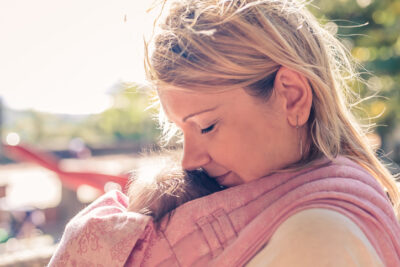Babies who sleep with their mothers (co-sleeping): An anthroposophical insight
Discussing his research into western parenting advice – which for the most part instructs parents on how to train their babies to sleep independently of the mother and to “self-soothe” – Dr McKenna states: “Maybe it had everything to do with recent western cultural ideologies and social values that more accurately reflect what we want babies to become, rather than who they actually are and what they need.”

As McKenna points out in comparison with other primate mammals, human babies are the most developmentally immature at the time of birth due to their passage through the birth canal with only 25 % of their adult brain. A baby therefore relies on its mother to continue to regulate its physiological systems after birth.
Separation of mother and baby versus co-sleeping
Separating the mother from the baby during sleep represents a “neurobiological crisis” for an infant baby.
As pointed out in the article, not breastfeeding and placing a baby in a separate room to sleep are now recognised SIDS risks.
McKenna’s study of the effects of temporary nocturnal separation on monkey infants, which showed that the breathing patterns of a baby monkey were regulated by contact with the mother, McKenna undertook and extensive clinical trial to see if the results could be replicated on human babies. McKenna and his team studied the physiological and behavioural effects of both
- nocturnal separation and
- of co-sleeping with breastfeeding.
He found that the close contact of a baby and mother regulated both the breathing of the baby but that the infant in-turn affected the mother in the same way. He also points out that when in combination with breastfeeding, the benefits for both mother and baby can be significant.
Co-Sleeping in Germany
As is the growing practice here in Germany, it is pointed out that co-sleeping is often undertaken by breastfeeding mothers as a way of regulating milk supply, improving attachment and increasing sleep. This of course needs to be done with the precautions of safe bedding and a safe sleeping environment.
When asked for his tips for new parents, McKenna suggests that parents should do what works for their family: “Above all else, keep in mind that babies have no agendas; they are not trying to make it hard on you, or manipulate you. With such an undeveloped little brain, they are about as close to their genes as any human will ever get and have little control over their behavior. In their first six to seven months of life, babies have no “wants,” only needs. Keep in mind that babies are as much “victims” of their behavior as you might be…. Don’t confuse the perceived medical good of sleeping through the night with a “moral good” — the idea that “good babies” sleep through the night. The worst invention culturally for all parents was the notion of the “good baby”.”
The article can be read in its entirety at: https://www.huffpost.com/entry/james-mckenna-co-sleeping-expert_b_7119782
Note:
The official position on co-sleeping varies from country to country and the issue is by no means black and white. It is therefore important for all parents to make an informed decision on the sleeping arrangements that they choose for their baby. All known SIDS risk factors should be taken into account.



